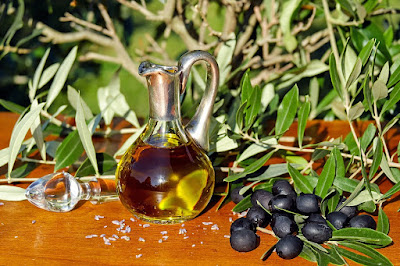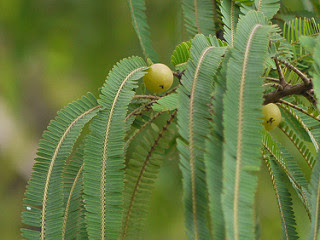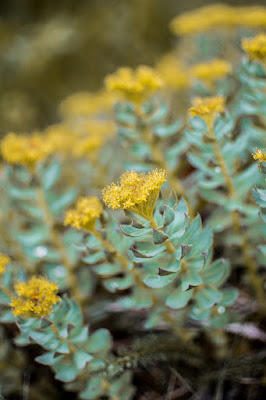Over the past two years numerous peer-reviewed studies have tested the ability of plant-based medicines for the treatment and prevention of COVID-19. How have they performed?
Watermelon Lowers Blood Pressure, Boosts Exercise Recovery
Yes, it’s true. Multiple clinical studies have now confirmed that watermelon has all of these effects. Let’s take a quick look at the science.
African Tree Bark Extracts Combat Malaria
 |
| Bark from Zanthoxylum species. Photo by Alex Popovkin |
Herbs and Other Natural Solutions to the Opioid Crisis
Soy, Menopause and Equol Production Explained
By now most of us have heard the recent news that eating soy can significantly increase longevity for breast cancer survivors. More information has been offered from a Tufts University study.
IBS Eased by Triple-coated Peppermint Oil
Clinical studies test peppermint oil
Both studies tested the use of peppermint oil in patients prior to having colonoscopies. Japanese researchers from the Mitoyo General Hospital in Toyohama studied 8,269 patients who were undergoing esophagogastroduodenoscopy. The patients were divided into three groups, and given either hyoscine butyl bromide, glucagon or peppermint oil prior to their colonoscopies. The researchers developed an antispasmodic score, which gauged the level of success the treatment had in reducing intestinal spasms during the procedure.
Intestinal spasms are a problem for colonoscopies because as the equipment is inserted, sensitive intestines will often spasm, which can cause problems during the procedure and possible injury to the intestines. Thus, the drugs hyoscine butyl bromide and/or glucagon are often given prior to colonoscopy procedures.
The problem with these drugs, however, is like other pharmaceuticals, they can produce a myriad of side effects. Hyoscine butyl bromide, for example, can produce nausea, urination difficulty, breathing problems, dizziness, vision issues, rashes, itching, swelling of the hands and/or feet and other side effects.
The Japanese researchers found that the group taking peppermint oil had antispasmodic scores that were similar to the two pharmaceutical groups. Elderly patients had better antispasmodic scores than those in the pharmaceutical groups.
The researchers concluded that, “peppermint oil was useful as an antispasmodic during esophagogastroduodenoscopy, especially for elderly patients.”
Encapsulated peppermint oil
Researchers from Iran’s Isfahan University found similar results in their clinical study of 65 adults. Again, the treatment was done prior to giving the patients colonoscopy procedures. The patients were given either the peppermint oil capsule called Colpermin or a placebo in capsules. The researchers measured and compared procedure times, spasm scores, pain scores, endoscopist satisfaction and patients’ willingness to repeat their colonoscopy between the two groups.
The peppermint oil group fared significantly better than the placebo group. The peppermint oil shortened the procedure times, increased the doctor satisfaction scores, and more of the peppermint oil patients were willing to have another colonoscopy than in the placebo group. More importantly, the spasm and pain levels were significantly lower among the group taking the peppermint oil prior to the procedure.
While these results indicate that peppermint oil is by far the better strategy prior to colonoscopy, the results also confirm what many traditional and alternative doctors have found in clinical environments: That peppermint oil reduces spasms associated with irritable bowel syndrome. Irritable bowel syndrome sufferers dread the pain and intestinal sensitivity related to having spasms. For an IBS patient, a spasm can sometimes result in several days of difficulties eating and having normal bowel movements.
The use of peppermint oil for irritable bowel syndrome is also confirmed by a limited amount of research. Researchers from the Albert Einstein College of Medicine in New York reviewed the available clinical research in 2007 and found that peppermint oil may well be an appropriate treatment of choice for those with irritable bowel syndrome. And a more recent review of the clinical evidence by scientists from the Leeds Gastroenterology Institute at St James’s University Hospital in the UK found that there was clear evidence that peppermint oil was a useful intestinal antispasmodic for those with irritable bowel syndrome.
Peppermint leaf and tea has also been used by traditionally for irritable bowel syndrome. However, clinical practitioners have found that peppermint oil in enteric capsules will deposit more of the active ingredients of the oil into the intestinal tract. Oil and leaf ingested orally can be partially digested in the stomach, leaving less of the oil available to the intestines. Ingesting peppermint oil directly can also aggravate heartburn symptoms. Enteric-coated capsules typically bypass the stomach.
The primary active constituents of peppermint oil include menthone and menthol.
This adds to other clinical evidence that triple-coated peppermint oil helps irritable bowel syndrome.
Delivery system is important
But herbalists have also learned that the method of delivery of the peppermint oil is critical.
When peppermint oil is used straight, it can produce some heartburn as it interacts with the stomach and esophageal sphincters. To help prevent this, manufacturers have created enteric-coated peppermint oil. The coating helps deliver the oil into the intestines before it interacts with the stomach or sphincters.
This works in many cases. Yet in still some cases, the enteric coating can break down early, releasing some peppermint oil into the stomach or pyloric sphincter region. This can irritate the sphincter, duodenal intestine and stomach walls. This isn’t in all cases. But some.
New triple-coated peppermint oil system
Recently, a new development in the delivery of peppermint oil for IBS conditions was clinically tested. The results were significantly better. Once again, they prove that peppermint oil, if delivered to the right location in the intestines, can significantly east IBS.
Image Courtesy of Digestive Diseases and Sciences Journal
The new system is called a triple-coated microsphere. The three coatings are, from outer to inner:
1) microcrystalline cellulose outer coating
2) pH triggered enteric middle coating impermeable to stomach acid but breaks down with intestinal acids
3) Inner seal that traps the terpenes within peppermint oil
The terpene trap is because it is the terpenes in peppermint oil that produces the heartburn sensation. The new formulation delivers pure peppermint oil and its main constituent, L-menthol, directly to the small intestines without disturbing the stomach wall or pyloric sphincter.
Clinical study tests the triple-coated peppermint oil
Researchers from the University of South Alabama and IM HealthScience studied 72 patients with moderate IBS – either IBS-diarrhea or IBS-mixed. These are advanced stages of IBS – diarrhea-predominant IBS or diarrhea and constipation mixed.
The patients were divided into two groups. One group was given a placebo, and the other group took two capsules of the triple-coated peppermint oil three times a day. The Ibgard supplement contained 90 milligrams of peppermint oil per capsule.
Both groups were assessed after 24 hours and four weeks of treatment. They were tested with Total IBS Symptom Score (TISS). The peppermint oil group saw a decrease in IBS symptoms of nearly 20 percent 24 hours after starting the treatment. After four weeks, the peppermint oil group saw a 40 percent decline in TIIS symptom scores. Compared to the placebo group, the peppermint oil group had a reduction of symptoms of nearly 42 percent.
The peppermint oil group also experienced a significant decrease in the number of severe and unbearable symptoms of IBS – about half of the placebo group.
Furthermore, only one of the peppermint oil group reported any discomfort from taking the supplement – and this consisted of flatulence.
Other studies proving peppermint oil eases IBS
Other research has supported the use of peppermint oil for IBS pain and spasms. These have confirmed single-enteric coated peppermint oil can have significant benefit as well.
In a 2013 study, researchers from the Mymensingh Medical College Hospital in Bangladesh conducted a randomized, double-blind, placebo-controlled study on 74 patients (65 completed the study) who had irritable bowel syndrome (IBS) with significant diarrhea.
The researchers gave the patients either a placebo or a capsule of peppermint oil three times a day for six weeks. The researchers assessed the pain and symptom scores at three weeks, at the end of the trial and two weeks after the end of the trial. The peppermint oil group had significantly less pain scores at the end of the trial compared to the placebo group.
In a 2007 study from Italy’s G d’Annunzio University Medical College, researchers gave a placebo or two enteric-coated peppermint capsules twice a day for four weeks to 57 irritable bowel patients in another double-blind, placebo-controlled, randomized study.
In this study, 75% of the patients taking the peppermint oil had more than a 50% reduction in total IBS symptoms. The peppermint oil group also had a significant reduction in symptoms four weeks after the study was completed.
The researchers concluded that:
“A 4 weeks treatment with peppermint oil improves abdominal symptoms in patients with irritable bowel syndrome.”
In a 2010 study, researchers tested 90 patients who had irritable bowel syndrome. In this placebo-controlled, double-blind and randomized study, the patients were given either a placebo or one enteric-coated peppermint oil capsule three times a day for eight weeks.
By the end of the eight weeks, the peppermint oil group had 14 people who were completely free of pain symptoms – more than double the rate of the placebo group. The peppermint oil group also had significantly better pain scores on average across both groups.
The researchers concluded that enteric-coated peppermint oil, “is effective and safe as a therapeutic agent in patients with IBS suffering from abdominal pain or discomfort.”
The enteric coating on the peppermint oil capsule is critical because this allows the peppermint oil to be delivered to the intestines with a minimal amount of digestive enzyme breakdown from the stomach. While peppermint tea and fresh peppermint has also been used by traditional healers for centuries for digestive issues including IBS, the enteric-coated capsule increases the speed and effectiveness of this natural remedy.
We’ve also discussed probiotics for IBS and cumin oil for IBS.
REFERENCES:
Imagawa A, Hata H, Nakatsu M, Yoshida Y, Takeuchi K, Inokuchi T, Imada T, Kohno Y, Takahara M, Matsumoto K, Miyatake H, Yagi S, Ando M, Hirohata M, Fujiki S, Takenaka R. Peppermint oil solution is useful as an antispasmodic drug for esophagogastroduodenoscopy, especially for elderly patients. Dig Dis Sci. 2012 Sep;57(9):2379-84. doi: 10.1007/s10620-012-2194-4.
Shavakhi A, Ardestani SK, Taki M, Goli M, Keshteli AH. Premedication with peppermint oil capsules in colonoscopy: a double blind placebo-controlled randomized trial study. Acta Gastroenterol Belg. 2012 Sep;75(3):349-53.
Wilkins T, Pepitone C, Alex B, Schade RR. Diagnosis and management of IBS in adults. Am Fam Physician. 2012 Sep 1;86(5):419-26.
Kligler B, Chaudhary S. Peppermint oil. Am Fam Physician. 2007 Apr 1;75(7):1027-30.
Dew MJ, Evans BK, Rhodes J. Peppermint oil for the irritable bowel syndrome: a multicenter trial. Br J Clin Pract 1984;38:394–8.Cash BD, Epstein MS, Shah SM. A Novel Delivery System of Peppermint Oil for Irritable Bowel Syndrome Symptoms. Dig Dis Sci. 2016 Feb;61(2):560-71. doi: 10.1007/s10620-015-3858-7.
Alam MS, Roy PK, Miah AR, Mollick SH, Khan MR, Mahmud MC, Khatun S. Efficacy of Peppermint oil in diarrhea predominant IBS – a double blind randomized placebo controlled study. Mymensingh Med J. 2013 Jan;22(1):27-30.
Cappello G, Spezzaferro M, Grossi L, Manzoli L, Marzio L. Peppermint oil in treatment of irritable bowel syndrome: a prospective double blind placebo-controlled randomized trial. a prospective double blind placebo-controlled randomized trial. Dig Liver Dis. 2007 Jun;39(6):530-6.
Merat S, Khalili S, Mostajabi P, Ghorbani A, Ansari R, Malekzadeh R. The effect of enteric-coated, delayed-release peppermint oil on irritable bowel syndrome. Dig Dis Sci. 2010 May;55(5):1385-90.
Citrus Boosts Circulation, Prevents Strokes, Boosts Cognition
These are conclusions from several research studies that have investigated the effects of eating different types of citrus fruits. Some have shown that eating citrus increases circulation, while others have shown that eating more citrus reduces the risk of strokes. Still others have found citrus fruits boost cognition even right after consuming it. Let’s review the evidence.
Herbs that Help Children with Behavior Issues
Modified Citrus Pectin Boosts Immunity
Olives and Olive Oil Inhibit Cancer and Alzheimer's
Medicinal Mushrooms Fight the Flu
A steady stream of research has confirmed that medicinal mushrooms have antiviral properties. A number of these studies have shown that many medicinal mushrooms can indeed inhibit the influenza virus. In other words, many mushrooms fight the flu.
Natural Remedies for Scabies
We can now add lemongrass to the list of plant oils (essential oils) that kill the Sarcoptes scabiei mites that cause scabies.
 |
| Lemongrass (Cymbopogon citrates) kills scabies mites. |
Pomegranate Helps Reduce Prostate Enlargement
Research confirms that pomegranate can help significantly reduce prostate enlargement and cancer risk among men.
 |
| Pomegranate inhibits prostate cancer cells. |
Dry Eye Relief with Plant Medicines
Research is increasingly showing that a number of herbal and food medicines can significantly help relieve dry eye syndrome (DES) or dry eye disease (DED).
 |
| Dry eyes are also often red and fatigued. |
Avocado Speeds Exercise Recovery
Avocados have now been shown to reduce recovery times after exercise.
 |
| Increased recovery times one of the many benefits of avocado |
Ayurvedic Amla Helps Heal Gut
Ginger Beats Allergy Drug in Clinical Study
Ginger reduces allergy symptoms according to a number of studies. But now we find studies show ginger outperformed a top pharmaceutical drug commonly used to treat allergies. This is according to a clinical study from a medical university. The study proved that ginger reduces allergy symptoms better and was safer than the pharmaceutical drug called Loratadine.
 |
| Ginger Plant |
Parsley Boosts Immunity, Curbs Inflammation and Fights Cancer
Multiple studies show that Parsley (Petroselinum crispum) contains significant anti-inflammatory properties, boosts liver health, is antioxidant and even anti-carcinogenic. It also supplies numerous nutrients and relaxes smooth muscles.
 |
| Parsley (Petroselinum crispum) fights cancer. |
Derris scandens Beats NSAIDs for Muscle and Joint Pain
Myrtle Herb Fights Antibiotic-resistant Skin Bacteria
This is ironic because the pharmaceutical industry typically opposes herbal medicine.
Proven Medicinal Benefits of Sea Buckthorn
Research evidence confirms that sea buckthorn (Hippophae rhamnoides) is truly a medicinal plant, with a number of proven health benefits.
 |
| Sea buckthorn (Hippophae rhamnoides) |
Onions Improve Scar Appearance According to Studies
Onions might be smelly, they can significantly improve the appearance of scars.
Onions contain a number of medicinal compounds. These include allylsulfides, cycloalliin, quercetins, isorhamnetin, mannose, flavonoids, flavinols, cysteine sulfoxides, selenium, thiosulfinates and sulfur compounds.
These compounds combine to offer onion the unique ability to stimulate the healing processes of the skin.
Research: Onions reduce skin scars
Researchers from Thailand’s Chulalongkorn University have confirmed that onions can significantly reduce skin scars.
The researchers tested a silicone derivative gel with 10% onion extract in 39 children who had received surgery requiring the opening of the sternum – also called median sternotomy.
The patients were divided into two groups and the onion gel or a placebo gel was applied to the scars using a split-scar method. This method splits the scar into halves and applies one part of the scar with one gel and the other part of the scar with the other gel.
The treatment was applied to each patient for six months, starting from seven days after their sternotomy surgery.
A median sternotomy is when the sternum is opened – also called “cracking” the sternum – to enable surgeons to treat congenital heart issues or otherwise operate on the heart. It leaves a scar in the middle of the chest.
Scar healing comparison
The researchers recorded the scar healing with progressive photographs along with the Vancouver Scar Scale. Of the 39 that began the study, 36 completed the six-month treatment.
The onion gel-treated group had six children who’s scarring completely disappeared (20%), while only one child among the placebo group was devoid of scarring.
Among the rest of the groups, only 9 of the onion-gel group was left with hypertrophic scarring while 18 of the placebo group had thick scarring – twice the rate.
A hypertrophic scar will remain red with definite boundaries where the scar meets the normal skin. The tissue will typically be raised over the skin due to a buildup of excess collagen. This contrasts keloid scarring, where the scar will be significantly more raised, with the appearance of a bubble at the scar.
Keloid scarring and possibly hypertrophic may be related to genetics, as it has been observed that darker-skinned individuals have a greater risk of keloid scarring. However, this does not eliminate the role of diet.
The researchers concluded that the onion-gel significantly decreased the incidence of hypertrophic scarring. This was seen across the board among the onion-gel group when the applied to the Vancouver Scar Scale. However, the onion-gel didn’t seem to help reduce keloid scarring among those children with keloid scars.
The researchers concluded:
“Onion extract in silicone derivative gel can significantly decreased the incidence of hypertrophic scar from median sternotomy wound in pediatric patients.”
Not the first study
This is not the first study that has investigated this onion-silicone gel. A 2012 study from Thailand’s Khon Kaen University studied 60 children who were patients after median sternotomy.
This study found that after three months of treatment with either the onion-gel or a placebo gel, those receiving the onion gel had less itching, less pain and a greater reduction of red pigmentation around their scars. The researchers concluded:
“A silicone derivative plus onion extract gel is safe and effective for the preventing the hypertrophic scarring after median sternotomy.”
What about silicone for scars?
In terms of the silicone aspect of the gel, other research has shown some benefit to silicone gel. A 2009 study explained how silicone aids wound healing:
“Silicone gel exerts several actions which may explain this benefit in scars:
• It increases hydration of stratum corneum and thereby facilitates regulation of fibroblast production and reduction in collagen production. It results into softer and flatter scar. It allows skin to “breathe”.
• It protects the scarred tissue from bacterial invasion and prevents bacteria-induced excessive collagen production in the scar tissue.
• It modulates the expression of growth factors, fibroblast growth factor β (FGF β) and tumor growth factor β (TGF β). TGF β stimulates fibroblasts to synthesize collagen and fibronectin. FGF β normalizes the collagen synthesis in an abnormal scar and increases the level of collagenases which breaks down the excess collagen. Balance of fibrogenesis and fibrolysis is ultimately restored.
• Silicone gel reduces itching and discomfort associated with scars.”
But silicone gel can also come with some adverse side effects such as skin irritation and it can be uncomfortable as a dressing, especially in hotter temperatures. Side effects of silicone injected into the body are well known – including neuralgia and Raynaud’s syndrome – but few side effects have been seen in skin application for short periods.
Then there is the onion extract
But it appears from this study that onion extract added to the silicone provides an even better resolution of scarring than the silicone alone. What is it about the onion extract? And can onion extract gel decrease scarring without the silicone?
It certainly can. While some studies have found little difference between onion gel and placebo, these were studies among patients with a low risk of hypertrophy. A 2012 study of 16 women patients who underwent cesarean sections with more risk of hypertrophy showed definite benefit. The women’s scars were treated with either a 12% topical onion gel or a “vehicle-based” placebo gel seven days after surgery on a split-scar method. The gel was applied three times daily.
The onion gel-applied scars had significantly less hypertrophy and lower mean scar heights at weeks four and twelve of the treatment.
Onions (Allium cepa) famously contain the antioxidant immune-stimulating quercetin. It also contains thioallyls also called alliins that break down into sulfides.
The combination of cysteine sulphoxides and other antioxidants such as ascorbic acid repel microorganisms and free radicals. But the quercetin in onions appears to be its active ingredient in the case of wound healing.
Indeed, laboratory studies have shown that quercetin decreases fibroblasts, decreases collagen deposits, decreases inflammation and helps stabilize mast cells.
REFERENCES:
Wananukul S, Chatpreodprai S, Peongsujarit D, Lertsapcharoen P. A prospective lacebo-controlled study on the efficacy of onion extract in silicone derivative gel for the prevention of hypertrophic scar and keloid in median sternotomy wound in pediatric patients. J Med Assoc Thai. 2013 Nov;96(11):1428-33.
Jenwitheesuk K, Surakunprapha P, Jenwitheesuk K, Kuptarnond C, Prathanee S, Intanoo W. Role of silicone derivative plus onion extract gel in presternal hypertrophic scar protection: a prospective randomized, double blinded, controlled trial. Int Wound J. 2012 Aug;9(4):397-402. doi: 10.1111/j.1742-481X.2011.00898.x.
Chanprapaph K, Tanrattanakorn S, Wattanakrai P, Wongkitisophon P, Vachiramon V. Effectiveness of onion extract gel on surgical scars in asians. Dermatol Res Pract. 2012;2012:212945. doi: 10.1155/2012/212945.
Plant Omega-3s versus Fish Oil for Heart Health
Plant Nutrients for Eye Health
Desert Spike Herb Reduces Surgery Pain
Herbal medicines for pain are cherished because they impart few if any negative side effects. Now we can another herbal medicine to our list of pain-relievers.
These American Herbs Fight Parkinson’s Disease
But many of the neurological symptoms that present in Parkinson’s disease have also occurred in the past with other conditions.
 |
| Elderberry flower extract slows Parkinson's progression. Photo by Edsel Little |
Lotus Herb for Depression, Anxiety, Liver Disease, Inflammation and More
The Lotus is not only beautiful. It can help fight depression, anxiety, inflammation, liver damage and help prevent cavities among other things.
 |
| Lotus herb provides numerous medicinal benefits. |
Essential Orange Oil Reduces Anxiety
Do you or your child dread the dentists’ office? How about anxiety otherwise? New research has found that orange essential oil can significantly reduce the anxiety of a trip to the dentist – or any other stressful occasion for that matter.
Licorice Root Reduces Liver Damage from Alcohol
According to the Centers for Disease Control, 38,170 Americans died from chronic liver disease (cirrhosis) in 2014. Of these, at least 19,388 were alcohol-related liver disease.
IBS Aided by Fennel Essential Oil and Curcumin
Black Sesame Seeds found to reduce High Blood Pressure
Research has found that black sesame seed can significantly reduce blood pressure among men and women.
 |
| Black sesame seed being ground |
Essential Oils Proven to Fight Ringworm Infections
Ask any veterinarian: Ringworm is one of those infections considered to have no conventional cure. When cats are infected, they may be cleaned and washed and hopefully will repel the infection over time, but there is no known cure for the infection among conventional veterinarians.
Melatonin from Certain Foods Naturally Help Us Sleep
 |
| Pineapples contain natural melatonin |
Essential Oils Fight Candida Better than Antifungals
Herbal Essential Oils that Fight Acne
Acne is typically caused by bacteria that grow within hair follicles. As the follicle becomes infected, our immune system launches an inflammatory attack against the bacteria. It attempts to surround and encapsulate the bacteria to prevent them from infecting the rest of the body.
 |
| Rosewood tree is part of essential oil formula that treats acne. Photo by Dinesh Valke |
































